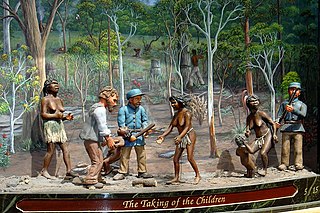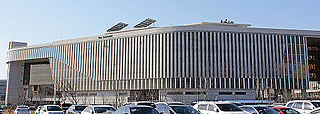Related Research Articles

The Stolen Generations were the children of Australian Aboriginal and Torres Strait Islander descent who were removed from their families by the Australian federal and state government agencies and church missions, under acts of their respective parliaments. The removals of those referred to as "half-caste" children were conducted in the period between approximately 1905 and 1967, although in some places mixed-race children were still being taken into the 1970s.

The 1988 Summer Olympics, officially the Games of the XXIV Olympiad and officially branded as Seoul 1988, were an international multi-sport event held from 17 September to 2 October 1988 in Seoul, South Korea. 159 nations were represented at the games by a total of 8,391 athletes. 237 events were held and 27,221 volunteers helped to prepare the Olympics.

Social services are a range of public services intended to provide support and assistance towards particular groups, which commonly include the disadvantaged. They may be provided by individuals, private and independent organizations, or administered by a government agency. Social services are connected with the concept of welfare and the welfare state, as countries with large welfare programs often provide a wide range of social services. Social services are employed to address the wide range of needs of a society. Prior to industrialisation, the provision of social services was largely confined to private organisations and charities, with the extent of its coverage also limited. Social services are now generally regarded globally as a 'necessary function' of society and a mechanism through which governments may address societal issues.
Child sex tourism (CST) is tourism for the purpose of engaging in the prostitution of children, which is commercially facilitated child sexual abuse. The definition of child in the United Nations Convention on the Rights of the Child is "every human being below the age of 18 years". Child sex tourism results in both mental and physical consequences for the exploited children, which may include sexually transmitted infections, "drug addiction, pregnancy, malnutrition, social ostracism, and death", according to the State Department of the United States. Child sex tourism, part of the multibillion-dollar global sex tourism industry, is a form of child prostitution within the wider issue of commercial sexual exploitation of children. Child sex tourism victimizes approximately 2 million children around the world. The children who perform as prostitutes in the child sex tourism trade often have been lured or abducted into sexual slavery.
The international adoption of South Korean children started around 1953 as a measure to take care of the large number of mixed children that became orphaned during and after the Korean War. It quickly evolved to include orphaned Korean children. Religious organizations in the United States, Australia, and many Western European nations slowly developed the apparatus that sustained international adoption as a socially integrated system.
Holt International Children's Services (HICS) is a faith-based humanitarian organization and adoption agency based in Eugene, Oregon, United States, known for international adoption and child welfare. The nonprofit works in thirteen countries, including: Cambodia, China, Colombia, Ethiopia, Haiti, India, Mongolia, Philippines, South Korea, Thailand, Uganda, Vietnam, and the United States. This work includes a range of services for children and families including efforts in nutrition, education, family strengthening, orphan care, foster care, family reunification, and child sponsorship. The organization's stated mission is to seek a world where every child has a loving and secure home.

Street children are poor or homeless children who live on the streets of a city, town, or village. Homeless youth are often called street kids, or urchins; the definition of street children is contested, but many practitioners and policymakers use UNICEF's concept of boys and girls, aged under 18 years, for whom "the street" has become home and/or their source of livelihood, and who are inadequately protected or supervised. Street girls are sometimes called gamines, a term that is also used for Colombian street children of either sex.

Education in South Korea is provided by both public schools and private schools. Both types of schools receive funding from the government, although the amount that the private schools receive is less than the amount of the state schools.

A migrant worker is a person who migrates within a home country or outside it to pursue work. Migrant workers usually do not have an intention to stay permanently in the country or region in which they work.

The Ministry of Health and Welfare is a branch of the government of South Korea. The headquarters is in Sejong City. Previously the headquarters were on floors 6 through 12 of the Hyundai Building in Jongno District, Seoul, when they were the Ministry for Health, Welfare and Family Affairs.
Prostitution is not illegal in Sri Lanka, however, related activities such as soliciting, procuring, and brothels are outlawed. It is also illegal to traffic persons for prostitution, especially minors. Prostitution is not as widespread in Sri Lanka as in some neighbouring countries. It is estimated that there are 40,000 prostitutes in the country, and nearly half of them operate in Colombo.

Women in South Korea have experienced significant improvements for social changes in recent years, compared to previous times, when Confucianism was deeply imbued in the culture. The economy of South Korea has tremendously improved due to urbanisation, industrialisation, military authoritarianism, democratic reform, and social liberalisation since the late 1960s. Gender roles and gender identities have been modified in response to modernity. More than half of South Korean women are employed. In a 2018 OECD economy survey, it was 56.1%. It is lower than OECD average. More than 25% of married women are employed as full-time workers.

Contemporary slavery, also sometimes known as modern slavery or neo-slavery, refers to institutional slavery that continues to occur in present-day society. Estimates of the number of enslaved people today range from around 38 million to 49.6 million, depending on the method used to form the estimate and the definition of slavery being used. The estimated number of enslaved people is debated, as there is no universally agreed definition of modern slavery; those in slavery are often difficult to identify, and adequate statistics are often not available.

Vagrancy is the condition of wandering homelessness without regular employment or income. Vagrants usually live in poverty and support themselves by travelling while engaging in begging, scavenging, or petty theft. In Western countries, vagrancy was historically a crime punishable with forced labor, military service, imprisonment, or confinement to dedicated labor houses.
Adoption in Australia deals with the adoption process in the various parts of Australia, whereby a person assumes or acquires the permanent, legal status of parenthood in relation to a child under the age of 18 in place of the child's birth or biological parents. Australia classifies adoptions as local adoptions, and intercountry adoptions. Known child adoptions are a form of local adoptions.
Social cleansing is social group-based killing that consists of the elimination of members of society who are considered "undesirable", including, but not limited to, the homeless, criminals, street children, the elderly, the poor, the weak, the sick, the needy and the disabled. This phenomenon is caused by a combination of economic and social factors, but killings are notably present in regions with high levels of poverty and disparities of wealth. Perpetrators are usually of the same community as the victims and they are often motivated by the idea that the victims are a drain on the resources of society. Efforts by national and local governments to stop these killings have been largely ineffective. The government and police forces are often involved in the killings, especially in Africa, Asia, and South America.

The Brothers' Home was an internment camp located in Busan, South Korea during the 1970s and 1980s . The camp was home to some of the worst human rights abuses in South Korea during the period of social purification and has been nicknamed "Korea's Auschwitz" by various Korean media outlets.
Reliable information about disability in North Korea, like other information about social conditions in the country, is difficult to find. As of 2016, North Korea is a signatory to the United Nations Convention on the Rights of Persons with Disabilities.
Forced adoption refers to the practice of removing children from their biological families and placing them for adoption against the wishes of the parents, often with little or no consent. This practice has historically been a significant issue in various countries, where societal, governmental, and institutional pressures led to the forced separation of children from their families, especially in cases where the parents were marginalized, impoverished, or deemed unfit by authorities. The practice has been widely criticized for its violation of human rights and its long-lasting emotional and psychological effects on both children and parents.
The Northern Territory Aboriginals Act 1910 was an Act of the South Australian parliament, assented to on 7 December 1910. The long name of the Act was "An Act to make Provision for the better Protection and Control of the Aboriginal Inhabitants of the Northern Territory, and for other purposes", and it established the Northern Territory Aboriginals Department and created the office of Chief Protector of Aborigines. On 1 January 1911, the Northern Territory was transferred from South Australia to federal government control. The 1910 Act was repealed by the federal government's Aboriginals Ordinance 1918 on 13 June 1918, which nevertheless carried forward many of the provisions of the 1910 Act. A 1939 amendment replaced the position of Chief Protector with Director of Native Affairs.
References
- 1 2 3 4 Hannah Cho and Asta Kongsted (10 September 2024). "South Korea finds mothers were forced to give up babies for adoption abroad". The Guardian.
- 1 2 3 4 Bugyeong Jung (30 May 2020). "Brothers' Home: South Korea's 1980s 'concentration camp'". BBC news.
- ↑ Susan Kim; Mary Ann Jolley (22 December 2021). "Surviving South Korea's house of horrors". Al Jazeera.
- ↑ Albert L. Park (9 August 2021). "Olympic Do-Over: How Olympic Redevelopment Erased South Korea's Past, Twice". Edge effects.